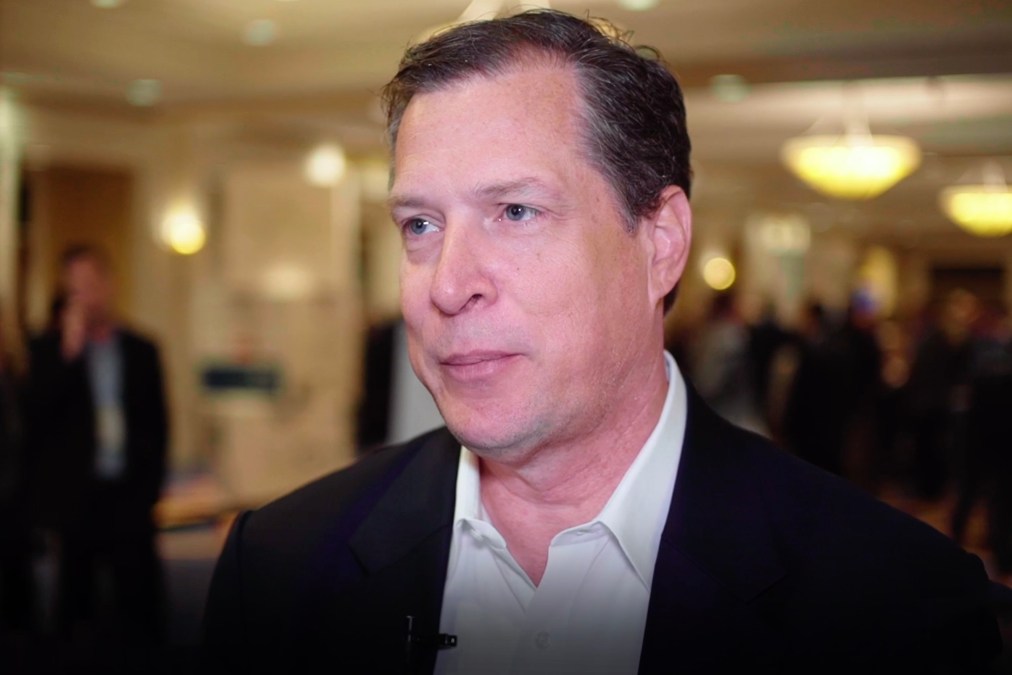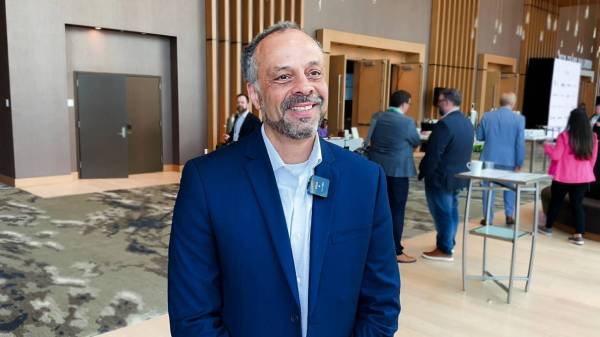Georgia CIO Calvin Rhodes reflects on decade of service

In a job where lasting five years earns veteran status, Georgia Chief Information Officer Calvin Rhodes entered an even smaller club this month as he marked a decade in his role.
Since being appointed by former Gov. Nathan Deal in 2011, Rhodes has played key roles in modernizing the state’s IT environment and launching a $110 million statewide cybersecurity center.
The National Association of State Chief Information Officers recognized his service this month by presenting its Decade of Leadership Award, which the organization says it doesn’t award very often. (It was last given out in 2017 when then-Tennessee CIO Mark Bengel hit the 10-year milestone.)
In an interview with StateScoop, Rhodes was pressed for juicy tidbits and off-color anecdotes from his decade with the Georgia state government, but instead revealed himself to be an industry stalwart who doesn’t seek accolades but earns them nonetheless.
In the words of New Hampshire CIO Denis Goulet, Rhodes is “the consummate professional.”
In addition to your business training, you earned a computer information systems degree at Georgia Southwestern State University. Do you remember any of your class projects?
My CIS degree was really a degree at that time of trying to teach a little bit about everything to try to give you a broad view of how systems work together. So, Fortran, COBOL, again I think it was more about teaching us structure versus teaching us how to be a programmer.
A driving direction for me to choose that as a major was a company I was working for at the time, that I actually ended up staying with for 27 years, had just recently moved from a paper-based system to a computer system.
I was actually going to ask you about your time there, at the Fulton Paper Company. How realistic is The Office?
[laughing] Not realistic. It’s just a normal small business that grew into a midsized business before we were sold to another organization.
You were there for a long time. How did you come to be appointed as Georgia’s chief information officer?
After being with the company for that long, I had a small ownership. At that point I was executive vice president of the company and with my three years of non-compete started off a little venture with some folks I knew, ran for state government and I had some political interest, but that didn’t quite work out. But I had the opportunity to meet [Deal] and meet some people on the transition team. A few weeks [after sharing my resume] they gave me an offer to join the state.
With the public-private partnership the state was in, there’s some things the new administration wanted to do differently and felt like that was a couple-year effort that aligned with my non-compete and I knew state CIOs typically didn’t stay in that role for very long, and so it all seemed to work well.
I knew a little bit about state government, but you quickly learn that as a citizen, our view of state government is very different from the operational side of state government.
So it wasn’t in your plan to stay as CIO for 10 years?
The answer is no. Again, when I started, the transition team and the governor felt like a few of the things they thought my skills aligned to would be a couple-year effort. And it took a little bit longer than that. But I have been very fortunate to work with a lot of great people and have the ability to put your fingerprint on some really important items across state government. The interest is in being able to do many different things and certainly the scale of systems that we work on is something that we work on in any given year.
What’s your secret to lasting a decade as state CIO?
I think one is, in any job, making sure you understand what the goals and priorities of whoever the leader happens to be. And in the executive branch of state government, we have many leaders we’re trying to work with and support their priorities. Quite often, I attribute success to building strong relationships, making sure that individuals feel that if they have a concern or if they’re trying to accomplish something that through that conversation you can help them not only as an individual but also bring your team to help whatever the business need and priority that’s been assessed.
Another thing I have told my peers that I think helps is realizing that the number of individuals that are working at the top level of an administration, including the governor, they have so much that’s being pushed in their direction and you’re in a role to try to solve items and keep it off their desk. Being able to handle things that they never need to have any awareness of is also I think a key asset, versus someone trying to show their level of importance in bringing multiple things forward rather than just handling them.
You alluded to the state’s IT modernization and consolidation effort. How has that project evolved to where it is today?
Well, it’s certainly the largest and most complex thing I’ve ever been a part of. [Gov. Sonny Perdue] started the effort. It was having some difficulty initially and it was thought that you would work with a few agencies and get some synergies and be able to move through improving the safety and the way systems could be more standardized and work. And very quickly everyone realized that there’s that standardization even within an agency and quite often you added on and did the best you could with the resources that were allocated. That didn’t give the ability to look at the architecture and embrace something that’s new and do it across the agency.
So that was a difficulty that my team was challenged to address and it probably took us a good two years to start seeing that we were making improvements in getting those programs stood up and another couple years before we were saying we were at the finish line.
What was your role in establishing the Georgia Cyber Center?
I definitely have it on my list of top two or three items I’m most proud of. Our role as a state authority was to come in and work side by side with a couple other folks the governor had made a priority for them. Augusta University was certainly a key player, the technical college system a key player. What started out as a cyber range for the state quickly developed into a center with a number of different components, including economic development. The center is more than a tool, it’s trying to develop an ecosystem for IT.
We had underestimated the amount of square footage needed for the state entity, which was cutting into what was available for the private sector, so the governor that evening committed to doubling the investment, which is how we moved from around a $50-$60 million project to a $110 million project before we even had the first beam out of the ground. That took it up to 332,000 square feet.
Are you going to stick around for another 10 years?
I will be here as long as the governor will let me stay in this role. And why wouldn’t I want to stay around? I have the opportunity to work with a great team of individuals and every day focus on how do we deliver to the citizens a more efficient way for them to interact with their state government.
This interview was condensed and edited.






